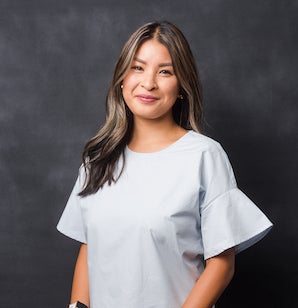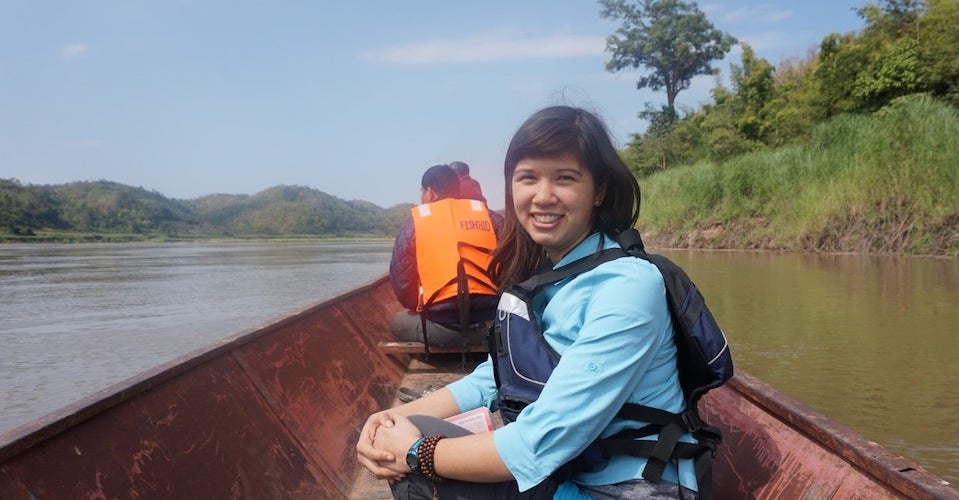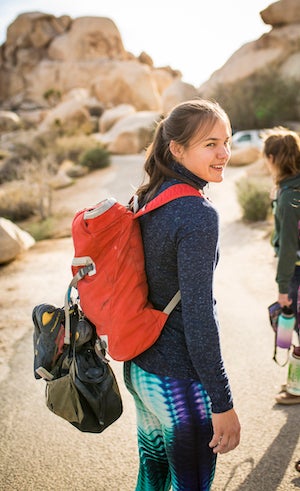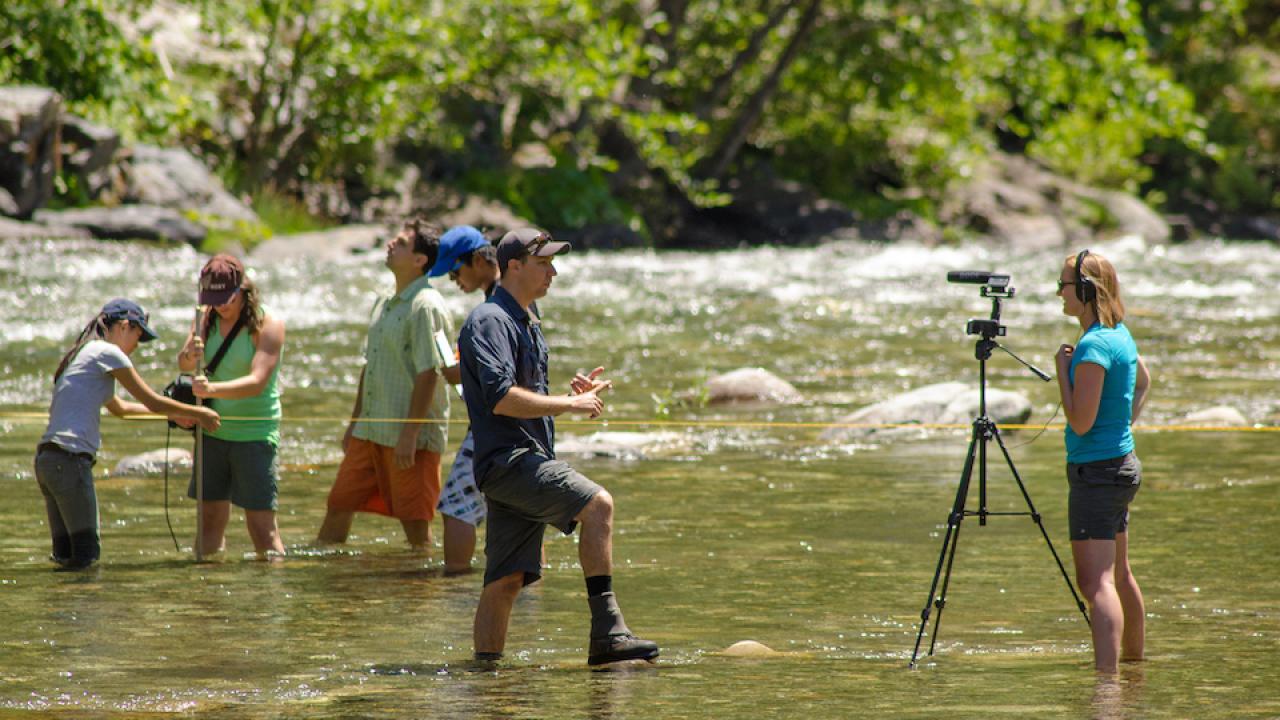Today’s global problems call for communicators who can explain science clearly to the public. To tackle beastly issues such as climate change and online privacy breaches will require systemic change and collective buy-in. We will need to understand complicated ideas.
Professional communicators who can break down complex concepts into accessible language come from a wide range of backgrounds. That became evident as I spoke with three UC Davis alumni who now work as science journalists and advocates. As a group, they studied international relations, art studio, biology, English and environmental science.
The three alumni said graduates of any major can become science communicators. What matters most is that you practice explaining science. They shared their surprising paths from UC Davis to becoming a BuzzFeed News technology reporter, a communicator/fishery biologist, and a freelance science journalist.
These interviews have been edited and condensed for clarity.

Nicole Nguyen
UC Davis ’12
Technology reporter, BuzzFeed News
What was your major?
International relations and art studio, double major. It’s kind of an odd pairing. I definitely knew I wanted a major with a global focus that was interdisciplinary, and international relations is great for people who are interested in everything and don’t like sitting still.
I didn’t know how incredible the UC Davis art department was until I took a drawing class. I got into printmaking and studied abroad twice with the art department — three times if you count Bodega Bay. The first was a program in this incredible villa in the Italian countryside. I was figure-drawing, learning Italian art history, and looking at architecture in Rome. The next year, I went to the south of France with art professor Gina Werfel, and that was an incredibly formative experience. Gina Werfel also led landscape painting at UC Davis’ Bodega Bay facility, which is mostly science-focused, but she hosts a summer session for art majors. We took our canvases out to Bodega Head and painted all day. The coastline there is incredible real-life inspiration.
How did your majors prepare you for your career path?
As a journalist, you have to become an expert in a subject really quickly and write about it with authority. You have to do a lot of deep research and synthesize it all into something that ultimately informs the public. As an international relations major, you’re taking a foreign language, economics classes, history classes — you get to be more of a generalist than a specialist, and that’s important for many early career journalists.
With my art major, I also had to think like an art critic when looking at my own work and my peers’ work, which helped me develop a critical lens. And I got a lot of writing practice too, which translated well to reporting. Plus, being in the studio for hours at a time helped my stress and anxiety levels. Being in both majors was necessary for my emotional well-being as well as my professional development.
How would you describe your career path after graduation?
Being a part of UCDC [Washington Program] really laid the foundation for me to become a reporter. In DC, I got an internship at a political magazine called The New Republic, which sparked my interest in political journalism.
I came back to Davis and cold-emailed the Sacramento bureau chief of KQED, and he gave me an internship. This industry is so limited to only a handful of cities, so I do feel like coming from Davis, you have to be a little bit scrappier than your peers based in New York, who have access to lots of different kinds of journalism jobs. I took whatever I could get, and I incrementally worked my way up.
Then I joined a women’s lifestyle publication, PopSugar, covering technology in a service-y and informal way, and that led me to my current role at BuzzFeed. I was initially hired as a lifestyle products editor — a lot of how-to stuff, how to use the internet and devices. That segued naturally to this reporting role now where I’m covering these new monopolies, Google and now mostly Amazon.
My career has never been defined by one thing: I was first a lifestyle journalist, then produced video, and am now doing traditional business reporting. And that’s what young people in media have to do these days. They have to be flexible and prepared for whatever jobs come their way and evolve with the times.
What have you learned about yourself?
I learned that I really liked not being pigeonholed into one role. I liked jobs that required me to do lots of different things in lots of different ways.
For one of my first jobs at PopSugar, I was doing social media, video production, on-camera work, and was also in the field, taking photos and writing. That was a really amazing first job because it allowed me to try everything. As I’ve progressed in my career, I’ve learned what I liked and whittled down my responsibilities to what I like most, which is writing about these giant, influential tech companies. But I never would have known it’s what I like most if I hadn’t tried other things in my previous roles, too.
Why do you enjoy writing about science and technology?
I love that it’s moving so fast. I often feel like things I write about are outdated within a year, and it’s exciting and terrifying to see the future so closely. And to understand very deeply the ways in which technology can be exploited for sowing disinformation or abusing or exploiting other people.
I follow the way technology impacts the health of our planet, climate change and environmental change, and that’s deeply a part of my Davis DNA. Being close to people so involved in creating solutions to mitigate that change made me hyper aware of how things impact our planet. I’ve found in my reporting that we often think of technology as virtual and digital, existing somewhere in the cloud. But computers and servers generate a lot of heat, and companies operating at scale like Amazon have a lot of them. Plus, they are shipping goods across our planet and producing a lot of carbon emissions along the way. Having gone to Davis just gives me this special lens that helps me see that impact more clearly.
What advice would you give to an aspiring science communicator?
Write a lot and get it published. One of my first outlets was the Aggie. I had to produce a column every week, and it was a set of clips I could show to employers. Having those clips is essential, essential, essential.
Academic papers help, too. Those classes where you work on your writing and voice are so important for any communications person, not just journalists.
It’s important to develop expertise in something you’re interested in. Science and technology are so broad, and having deep knowledge of one aspect makes you more hirable and write with more authority. The way you do that is by reading a lot of published work in that field. It could be as simple as setting up a Google alert every time “blockchain” or “cybersecurity” is mentioned, for example. Follow think tanks and journalists in those areas on Twitter and familiarize yourself with the major players, the companies and the people lobbying against those companies. Where is the research being done, and who are those professors? All of that is really helpful in being, “Oh, this is the person who covers X thing, and they know more about it than anyone else.”
If you do want to cover science and tech issues, I don’t think it necessarily requires a science degree. It involves effective, strong reporting skills and writing, first and foremost.
Erin Loury
UC Davis ’07
Communications director and fisheries biologist, FISHBIO

Why did you study biology and English?
Ever since I was in high school, I loved the arts, English and writing as well as nature, science and conservation, and it was really hard for me to choose, so I decided to do both humanities and science until I was forced to choose one. I’ve been able to turn that into a career where I emphasize writing and science at different points in my career.
How do you feel it prepared you for your current path?
It was helpful for me to feel like I had that creative outlet while studying biology.
Then I had an internship at the UC Davis news service, and it introduced me to science writing. I was writing about a book by professor Stephen Vosti, and I interviewed him about his research in the Amazon. It got me thinking about the direction of my own studies. He was looking at nature, conservation, poverty and people depending on natural resources. What I really care about is the ocean, so it got me thinking about that same relationship. That’s what led me to fisheries. After I graduated from Davis, I focused on fish and learning biology, but that all stemmed from that internship.
How did you land your current job?
It was through a former labmate from graduate school, where I studied marine science. My pipe dream was to take the issue of fisheries and study in Southeast Asia because my mom is from Vietnam. I could blend my personal and professional passions into a career. It seemed like a long shot. But while doing a science communications graduate program at UC Santa Cruz, I learned in an email from my labmate that her current company, FISHBIO, had work in Laos
It became clear that they wanted someone with my skill set: a strong writer who had experience with fisheries. I’ve landed this job as a communications director with the ability to be a fishery biologist. I was stubborn about seeing if I could do both, and I feel fortunate that I’ve kept a foot in both of those worlds.
Most of what I do now is program management. I’m corresponding with communities in Laos because there have been issues with overfishing. We ask, “Where’s the good habitat we should protect?” Where people depend on fish for their livelihoods, my work often is a lot more about the people than the fish. We’re working with people to conserve the fish, so it keeps things interesting.
You’ve written that fish are a bridge between nature and people. What drew you to fish in the first place?
I didn’t want to do it just for the sake of learning about science. I wanted to have a meaningful impact on people’s lives as well. That idea got planted in my head in that conversation with Steve Vosti. People ask if I grew up fishing, and for me it was this nerdy academic exercise that led me to fish, but it was cool to have that clarity of why I want to study this animal. I’ve come to think fish are really cool, but I came to them from the academic route.
What do you enjoy about your current job?
My favorite part is sharing with people how cool fish are, whether that’s through writing, education and class visits or producing videos or hosting workshops. I get to communicate using a lot of different tools, and that’s been pretty incredible. Traveling in Southeast Asia has been exciting as well. There’s constantly more I feel I need to be learning about and enough to keep me interested for a long time.
What advice would you give to an aspiring science communicator?
I would say to keep an open mind. I would not have imagined myself working in the kind of position I'm in. If you had asked if I would work for a fishery consultancy, I would have said, “No, not my first choice.”
I’ve realized that science communication can take many different forms. It’s valuable to identify how you most enjoy communicating, whether it’s through writing, speaking with people, podcasts or teaching. There are so many ways to communicate about science. That’s exciting, but it means you have to pick what skills you want to develop.
A good way to dabble in science communications would be to start a blog or use social media to stretch your creative muscles. Or find ways to do outreach, lead tours to visiting school groups.
What advice would you give science majors interested in communications?
You don’t have to wait until you’re finished with science to make the switch to science communication. You can do a bit of both.
Some of the best science communicators are also scientists who are gifted at communicating with the general public. It’s like speaking two languages and translating. Scientists sometimes throw around jargon and assume everyone should know what it means. It’s a really valuable skill for anyone to have, and it’s really wonderful if scientists can do it themselves. There’s always a need for people to help scientists who aren’t wanting to take on the burden of communication to be the link between science and the public, but it’s wonderful when scientists can communicate about their own work as well. It raises the profile of their work, and people see them as accessible and admirable.

Ula Chrobak
UC Davis ’14
Science and adventure writer
What drew you to the environmental science major?
I took soil science my first semester and thought, This is awesome, this is the right fit. I love that it was very important but an underappreciated resource. And soil is so important to a lot of global processes and food and natural resource management.
How do you feel it prepared you for your current path?
Because it was such a broad major I always felt I was learning something new. In soils classes, you go through so many different landscapes and dig soil pits and learn about the soil forming processes in that area and you get to camp and it’s a blast.
I think I learned that I really preferred to learn and synthesize ideas as opposed to being in the lab. I’m glad I got research experience while I was there, but I always preferred using information and making a point or a story with it.
What did you learn about yourself and your interests through that undergraduate research?
I was assessing different gasses released from agricultural activity and putting a what looked like a baking can upside down on the ground and extracting the gasses coming from the soil. It was so much work to get the samples, and it helped me appreciate that aspect of science — even though it helped me say that I don’t think I can go to grad school to study science. It’s hard for me to focus on one detailed question, which that would require.
I felt weird about it at the time because it seemed like the path I should be going on, and I was like, What’s wrong with me? It was great to find out that there are other people like me through science communication.
You eventually did a policy internship with the California State Assembly. What was that like?
I was interested in policy because that seemed like an application for my skill set, and I could take science information and apply it somehow. The internship was a lot of sorting through notices, and I learned about how state government worked and being in that space was cool and interesting.
I’m still super glad I did it, and I like knowing how things work. It’s part of why I’m a journalist, so being in the capital was a cool thing for me.
How did you decide to attend grad school for science communications?
For me it just seemed like a practical way to switch my career. I did environmental planning, which is one of the bigger fields that environmental science angles you toward, but I was just not super psyched on private environmental consulting and didn’t feel like I was making that much of an impact on the world. So I thought, Oh, you know, maybe science communication because you reach a broader audience and learn new things.
It helps to have published writing, so I started blogging about rock climbing and science. Then when I applied, I had samples to show and that’s how I got to UC Santa Cruz Science Communication Program.
You’re in internships right away working in an actual newsroom, and some of my cohort had stuff published in newspapers their first day in the program. You get so much experience writing fast, getting stuff published. They give you all sorts of exposure to different styles and forms of science writing and do multimedia training, investigative reporting. Another aspect is that a lot of people who teach there are experienced journalists, and they’re good people to know and learn from. There are so many mentors and connections you can have through that program.
How did you land your current job?
After the program, I interned part-time at the University of Colorado Boulder’s news office and part-time at Climbing magazine — because climbing. Eventually I found out they were hiring a temporary associate editor at CU Boulder’s alumni magazine.
While I was there, an editor at PopSci reached out to me to write a news story. I was super excited and dropped what I was doing that day to write it. And then the editor later asked if I wanted to be an environment contributor. So now I write about two news stories a week for their website.
The contributor gig is great because I’m covering a single beat, the environment. I’m helping them cover this whole area and learn what’s going on in current events and science. It’s been a lot, but I’ve been learning so much and been more comfortable with my voice and my writing and hopefully that experience will add up. I’m currently doing that about half-time while working on other stories for places like Climbing magazine and REI Co-op Journal.
What advice would you give to an aspiring science communicator?
The most important thing is just to start writing, even if it’s just a blog. The field can be fairly competitive and the grad programs are competitive. You need to show you’re passionate and interested in this. I love what I do, but it’s hard work.
You can even write for your university news office during undergrad. Learn what opportunities there are at the school to contribute writing. Or try to find a local newsroom that’ll hire you to write news stories, get out to do some writing and get a feel for it to see if you enjoy it. Get that experience so when you apply, they see you have it.
The thing you’re most passionate about is the thing you’ll write the best about. People who aren’t in a science major can do science communications, too.
Get involved in an organization to communicate science, even if it isn’t written. As an undergrad, I was the education and outreach director of Project Compost and I was communicating science. What I learned in soil science became part of my workshops on how to compost. Teaching shows you’re passionate and gets you talking about science and learning how to communicate with people.
Rebecca Huval is digital managing editor on the web team, and she edits the Majors Blog.
